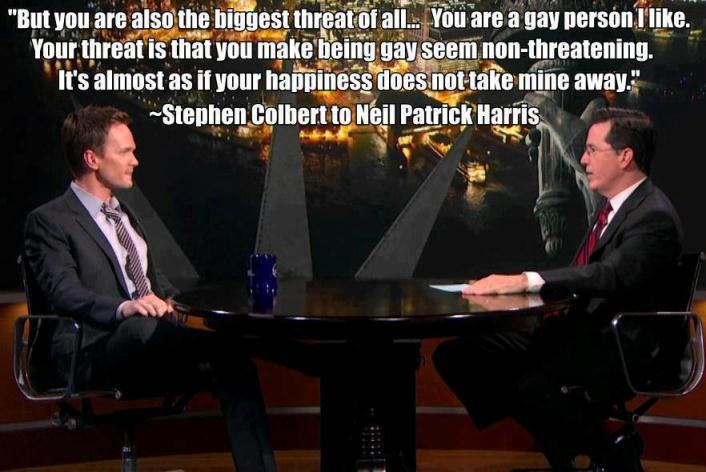Michael-in-Norfolk posted this graphic from Neil Patrick Harris’ appearance on The Colbert Report.
Michael writes:
If people find out that we LGBT individuals are basically just like them, that we have similar hopes and dreams and, God forbid, that we have normal functioning families, the Christianist anti-gay jihad falls apart. … It’s easy to hate and oppose something/someone unknown. It’s far harder when the targets of hate are one’s friends, neighbors and family members.
This, I believe, is a huge part of the reason that Millennials are increasingly skeptical about the church, and particularly the evangelical Protestant parts of the church.
Note that it’s not simply that they disagree with what the older generation of evangelicals is teaching about LGBT people. It’s that they have come to see that the older generation is lying to them about LGBT people.
Lying is not a good way to earn or to keep trust. Particularly not when the lie is one that is so easily refuted just by meeting actual people — those friends, neighbors and family members Michael mentions. Millennials have grown up knowing and knowing of many LGBT people and they have seen, firsthand, that these friends, neighbors and relatives are nothing like the portrait painted of them by the older generation of evangelicals.
I wrote about this last year in a post discussing “the generational chasm that seems to have opened in two of the vanguard groups opposed to equal legal rights for GLBT people: Republicans and evangelical Christians”:
Polls of both groups continue to show a large disparity between the antigay views of older members and the lack of such sentiment among younger members. Those younger Republicans and evangelicals recognize the need for non-sectarian legal arguments in support of nonsectarian legal discrimination, and the lack of such arguments from their older counterparts is a big part of the reason that older, antigay Republicans are now seeing, for example, their own daughters recording videos on behalf of New Yorkers for Marriage Equality.
Another component of this generational divide is that younger evangelicals and Republicans tend to have friends, acquaintances and co-workers who did not hide their GLBT identity the way the older generation’s friends, acquaintances and co-workers were forced to hide theirs. The younger generation thus knows people, and knowing them, they know that these people are not the dangerous bogeymen that the older generation makes them out to be. The younger generation has learned that what the older generation has to say about this issue cannot be trusted — it is objectively not true.
The older generation of anti-gay evangelicals says that this amounts to a disturbing “moral relativism” on the part of these younger Christians, but what the younger Christians see is an immoral and deeply ingrained dishonesty on the part of these older evangelicals who continue to bear false witness against GLBT people. The “moral relativism” they see is the older generation’s willingness to say false things in pursuit of a political agenda — the ends-justifies-the-means reasoning of those who think lying about GLBT people is somehow justified in pursuit of the supposedly greater good of “traditional values.”













